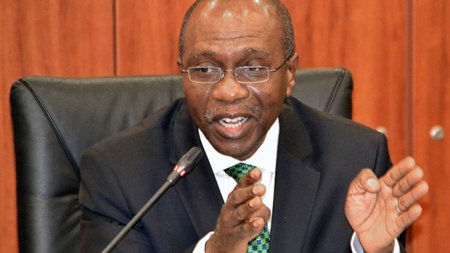L
LequteMan
Guest
Governor of the Central Bank of Nigeria, Godwin Emefiele, has stated that the apex bank introduced a new flexible foreign exchange policy to counter the continued depletion of the nation's foreign exchange earnings and reserves.
In a statement released on Wednesday, he said CBN had to take the measures as Nigeria has “witnessed a significant decline in our foreign exchange reserves from about US$42.8 billion in January 2014 to about US$26.7 billion as of June 10, 2016.
“In terms of inflows, the bank’s foreign exchange earnings have fallen from about US$3.2 billion monthly to current levels of below a billion dollars per month," he explained. "The interplay between reduced foreign exchange supply and rising demand accounted for a substantial reduction in our foreign exchange reserves.”
He blamed the poor foreign exchange receipts on the over 70 per cent drop in the price of crude oil; global growth slowdown and geopolitical tensions along critical trading routes in the world; and normalization of monetary policy by the United States’ Federal Reserve.
He, however, stated that the country is still in a good position.
"Our reserves, despite having fallen, is still robust and is able to cover about five months of Nigeria’s imports as against the international benchmark of three months," he said, adding that his team at the CBN would ensure transparency in the new foreign exchange market regime and that there would be no place for speculators.
In a statement released on Wednesday, he said CBN had to take the measures as Nigeria has “witnessed a significant decline in our foreign exchange reserves from about US$42.8 billion in January 2014 to about US$26.7 billion as of June 10, 2016.
“In terms of inflows, the bank’s foreign exchange earnings have fallen from about US$3.2 billion monthly to current levels of below a billion dollars per month," he explained. "The interplay between reduced foreign exchange supply and rising demand accounted for a substantial reduction in our foreign exchange reserves.”
He blamed the poor foreign exchange receipts on the over 70 per cent drop in the price of crude oil; global growth slowdown and geopolitical tensions along critical trading routes in the world; and normalization of monetary policy by the United States’ Federal Reserve.
He, however, stated that the country is still in a good position.
"Our reserves, despite having fallen, is still robust and is able to cover about five months of Nigeria’s imports as against the international benchmark of three months," he said, adding that his team at the CBN would ensure transparency in the new foreign exchange market regime and that there would be no place for speculators.


